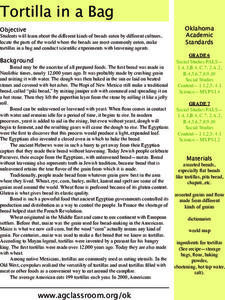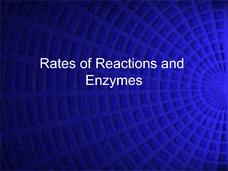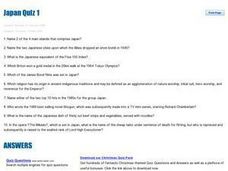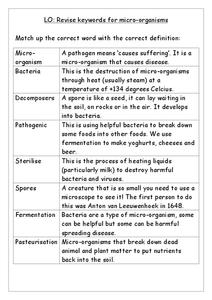Curated OER
What's the Matter with My Orange?
Students use oranges to informally explore decomposition, dehydration, fermentation, the water cycle, bacteria, yeast, food webs, the needs of living things, and physical vs. chemical change over a period of three or more months.
Serendip
Is Yeast Alive?
Through two investigations, life science learners determine whether or not yeast is alive. They perform tests for metabolism by providing sugar and observing if gas is produced as a byproduct. They incubate some of the sample for at...
Curated OER
Tortilla in a Bag
An engaging, and interesting instructional activity of types of bread found around the world awaits your charges. In it, learners compare and contrast manjy types of breads that come from cultures all over the globe. They utilize...
National Renewable Energy Laboratory
No Fossils in This Fuel
Yeast and sugar go beyond the pantry and into a fuel experiment. Use these common baking ingredients to assist your class in creating ethanol, a natural fuel. Pupils observe the process and gather information to elaborate on the...
Curated OER
Identification of Gram Negative Bacilli
In this biology worksheet, learners review the procedures used to complete the lab activity and then examine the purpose and add the information while answering the questions.
Curated OER
Aerobic/Anaerobic Respiration
Both aerobic and anerobic respiration are introduced in this succinct PowerPoint. The chemical equations for both are included. The last slides give instructions for a lab activity in which pupils use a gas sensor to measure the...
Curated OER
Kernel Count!
Here is an impressive and thorough instructional activity on estimation. Young mathematicians estimate how many kernels of popcorn can fit in a tablespoon, then how many tablespoons of kernels can fit in a baby food jar. The popcorn is...
Curated OER
Cellular Respiration
In this cellular respiration worksheet, students use 14 terms from a word bank to complete a graphic organizer showing the relationship between the words.
Curated OER
Rates of Reactions end Enzymes
Introducing enzymes and the controlling factors of a reaction this slideshow displays the typical rate of reaction graph and labels the main sections. The summaries of ways to measure reaction rates are valuable and the examples of...
Nuffield Foundation
Microbes Ate My Homework
Now you have a new excuse not to do your homework. A long-term experiment has learners explore cellulose-digesting enzymes. They simulate how paper breaks down in a compost bin. There's no need to blame your dog for eating your homework...
Nuffield Foundation
Working with Immobilized Enzymes or Microscopic Organisms
Let the lab be a catalyst to learn about enzymes. Scholars create alginate beads filled with yeast. As part of an investigation into enzymes, they see how these beads provide a catalyst to the reaction of glucose into ethanol.
Serendip
How Do Muscles Get the Energy They Need for Athletic Activity?
Every muscle movement requires energy, but where does that energy come from? Scholars answer this question and more as they complete a worksheet. By following the directions, completing research, and discussing it as a class, they begin...
Curated OER
Identification of Gram Negative Bacilli—Oxidase
In this biology worksheet, students identify the different types of reagents being used with the samples as part of an extensive lab experiment.
Curated OER
What Should I Know about Respiration
How are kids supposed to know what to study for that cellular respiration test? With a study guide or reading guide like the one found here. With three pages of questions important to the understanding of respiration and the processes...
Curated OER
Measuring Temperature and the Production of CO2 in Yeast
Students use a model experiment to complete an experiment on yeast. In groups, they identify the independent and dependent variables and use the scientific method to complete the activity. They record their observations and discuss them...
Curated OER
Unit: Processing and Manufacturing: Examination Three
StudentsMatch the vocabulary terms in column A with the definitions in column B. Write the letter of the definition in column B in the space next to the terms in column A. Afterwhcich, students Write short answers or fill in the blank to...
Curated OER
Japan Quiz 1
In this Japan quiz 1 worksheet, students answer 10 trivia-style questions about Japan, not interactively, then scroll down to check their answers.
Curated OER
Got Gas? How Much?
Learners perform an experiment that measures respiration. In this performing an experiment that measures respiration lesson, students discuss aerobic and anaerobic respiration. Learners measure the gas produced by putting yeast in...
Project Food, Land & People
Loco for Cocoa
Students create a time line and map about how chocolate traveled the world. In this chocolate lesson plan, students also create and taste chocolate.
Curated OER
Biotechnology
A continuous cascade of information comes through this PowerPoint on biotechnology. The topic is defined, a history is presented, and basic genetic engineering techniques are explained. The topic is covered in an objective manner,...
Curated OER
Respiration
In this science worksheet, students answer 14 questions about respiration. For example, "Cellular Respiration starts off with..."
Curated OER
Micro-Organisms
In this identifying the definitions of micro-organisms activity, students match the correct key words with the correct definitions. Students match 8 answers.
Curated OER
Graze Like a Cow
Students explore how a cow digests the grass they eat. In this science/math lesson, students compare the quality of forage. Additionally, students determine the effects of rangeland health on the production.
Curated OER
Yeasts and Molds
Students investigate the characteristics and nature of yeast and molds help to explain how these microorganisms affect food production. They experiment with yeast in sourdough in preparing sourdough pancakes.

























